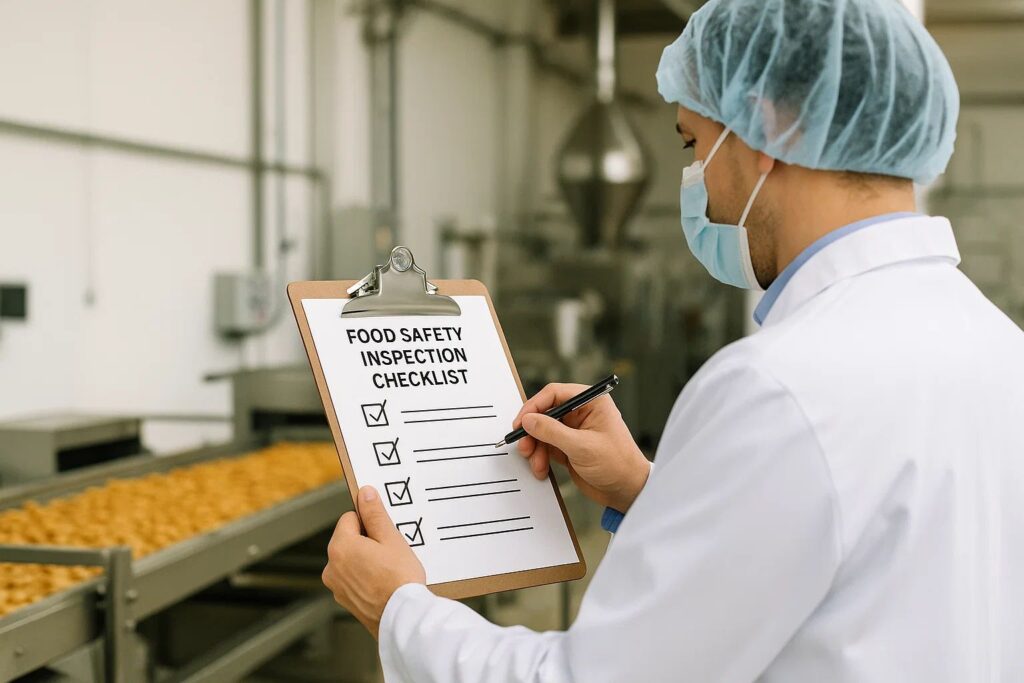What Is Food Safety Compliance and Why Does It Matter?
Food safety compliance represents a structured system of regulations, standards, and practices that food businesses must follow to ensure their products are safe for consumption. It encompasses every aspect of food handling – from sourcing raw materials to serving the final product to customers.
The primary purpose of food safety compliance is to protect public health through:
- Prevention of physical contamination (glass, metal, plastic)
- Control of biological hazards (bacteria, viruses)
- Management of chemical risks (cleaning products, pesticides)
- Proper allergen handling and labelling

The Real Impact of Foodborne Illnesses
Food safety breaches can devastate both consumers and businesses:
- Health Consequences: Ranging from mild discomfort to severe illness or death
- Business Costs: Average recall expense of £30,000 to £300,000
- Reputation Damage: Long-lasting negative impact on brand trust
- Legal Implications: Potential fines and criminal charges
For food businesses, compliance isn’t just about meeting legal requirements – it’s about maintaining customer trust and protecting your brand’s reputation. A single food safety incident can lead to significant financial losses, damaged customer relationships, and potential closure of your business.
By implementing robust food safety compliance measures, you create a protective shield around your operations while demonstrating your commitment to customer wellbeing.
Who Are the Key Regulatory Bodies Governing Food Safety Compliance?
Food safety compliance in the United States is primarily overseen by two main regulatory bodies: the Food and Drug Administration (FDA) and the United States Department of Agriculture (USDA).
The Role of the FDA
The FDA is responsible for regulating:
- 80% of the U.S. food supply
- Packaged foods
- Fruits and vegetables
- Seafood
- Dairy products
The Role of the USDA
The USDA supervises:
- Meat and poultry products
- Processed egg products
- Grading services for specific foods
The Impact of the Food Safety Modernization Act
A significant advancement in food safety regulation occurred with the enactment of the Food Safety Modernization Act (FSMA) in 2011. The FSMA marked a shift in focus from merely responding to instances of contamination to actively preventing such occurrences.
This legislation grants the FDA new powers to:
- Require comprehensive preventive controls
- Conduct mandatory recalls
- Ensure that imported foods meet U.S. standards
- Establish an integrated national food safety system
How Compliance Is Enforced
These agencies ensure compliance through various methods, including:
- Regular inspections of facilities
- Testing of food products
- Reviews of relevant documentation
- Implementation of risk-based preventive controls
- Issuance of import alerts and detention orders
- Imposition of civil and criminal penalties for violations

Collaboration with State and Local Agencies
The FDA and USDA collaborate closely with state and local agencies to build a strong food safety network. Together, they establish science-based standards, provide guidance documents, and update regulations to address emerging challenges in food safety and advancements in technology.
Find more on: Business Temperature Monitoring Solutions for Reliable, Round-the-Clock Protection
What Are the Core Components of Food Safety Compliance?
Food safety compliance relies on several critical components that work together to create a robust safety management system. At its core lies hazard analysis – a systematic approach to identifying potential biological, chemical, and physical risks in your food production process. Learn more about hazard on https://ehs.gmu.edu/physical-hazards/
1. Hazard Analysis
Hazard analysis is the foundation of food safety compliance. It involves systematically identifying and assessing potential risks in your food production process. This includes biological hazards (such as bacteria or viruses), chemical hazards (such as allergens or contaminants), and physical hazards (such as foreign objects).
2. Critical Control Points (CCPs)
Critical Control Points (CCPs) are specific stages in your production process where you can prevent, eliminate, or reduce food safety hazards to acceptable levels. These points are crucial for ensuring the safety of your products.
Examples of CCPs include:
- Cooking temperatures for raw ingredients
- Cooling procedures for prepared foods
- pH levels in fermented products
- Metal detection in packaged goods
Each CCP requires critical limits – measurable parameters that separate acceptable from unacceptable. For example, chicken must reach an internal temperature of 75°C to ensure safe consumption.
3. Proper Labelling and Traceability
Proper labelling and traceability are essential for food safety compliance. Your labelling system should include important information such as product identification codes, batch numbers, production dates, storage requirements, and allergen information.
A robust traceability system allows you to track ingredients from supplier to final product, enabling quick response to safety issues. This farm-to-fork approach helps you identify contaminated products, execute targeted recalls, document ingredient sources, and monitor product movement through your supply chain.
4. Digital Solutions for Automation
Modern food businesses are increasingly using digital solutions to automate these components of food safety compliance. By implementing technology such as software systems and mobile applications, businesses can ensure accurate documentation and real-time monitoring of critical safety parameters.
This automation not only improves efficiency but also reduces the risk of human error in record-keeping and reporting processes.
How Do Food Businesses Ensure Effective Monitoring and Control?
Food businesses implement robust monitoring systems through advanced technology and strict hygiene protocols. Physical contamination detection relies on sophisticated equipment:
1. Metal Detection Systems
Metal Detection Systems identify metallic contaminants in food products, including:
- Ferrous metals
- Non-ferrous metals
- Stainless steel particles
2. X-ray Inspection Technology
X-ray Inspection Technology detects various foreign objects:
- Glass fragments
- Stone particles
- Dense plastic materials
- Bone fragments
Maintaining hygienic environments requires systematic cleaning protocols:
1. Daily Cleaning Schedule
The daily cleaning schedule includes:
- Equipment sanitisation before and after use
- Surface disinfection between tasks
- Waste removal at regular intervals
2. Equipment Maintenance
Equipment maintenance involves:
- Regular calibration of monitoring devices
- Documentation of cleaning procedures
- Verification of sanitisation effectiveness
Food businesses must establish Standard Operating Procedures (SOPs) for:
- Hand washing stations
- Personal protective equipment usage
- Chemical storage and handling
- Cross-contamination prevention
These monitoring and control measures create multiple barriers against potential hazards, ensuring food safety throughout the production process. Regular audits verify the effectiveness of these controls and identify areas for improvement. Click here to find more about measures.
How Can Staff Training Support Food Safety Compliance?
Staff training is crucial in ensuring food safety compliance. When employees are properly trained, they become an effective barrier against foodborne illnesses and contamination risks.
Essential Training Components:
- Safe food handling practices
- Personal hygiene protocols
- Temperature control management
- Cross-contamination prevention
- Allergen awareness
- Emergency response procedures
Regular training sessions keep staff updated and reinforce correct safety procedures. Your employees are the first line of defence in preventing food safety incidents. Each team member must comprehend their specific role in upholding compliance standards.
Training Benefits:
- Reduced risk of food safety incidents
- Enhanced customer protection
- Lower operational costs
- Improved inspection readiness
- Strengthened team confidence
- Better regulatory compliance
Staff education programmes should cater to various learning styles and experience levels. Hands-on demonstrations, visual aids, and practical assessments help ensure thorough understanding of safety protocols.
Employee Responsibilities:
- Following established hygiene procedures
- Reporting potential safety hazards
- Maintaining accurate documentation
- Implementing corrective actions
- Participating in refresher training
Digital training platforms enable consistent delivery of educational content across multiple locations. These tools track completion rates, assess comprehension, and maintain training records for audit purposes.
What Modern Technologies Enhance Food Safety Compliance?
Digital transformation has completely changed the way food safety compliance works. It has introduced new and creative solutions that make it easier to monitor, track, and document processes.
1. Cloud-Based ERP Platforms
Cloud-based ERP platforms offer several benefits for food safety compliance:
- Real-time visibility across supply chain operations
- Centralised data management for instant access to compliance records
- Automated alerts for compliance breaches or threshold violations
- Integration capabilities with existing business systems
2. IoT Devices and Smart Sensors
IoT devices and smart sensors play a crucial role in ensuring food safety:
- Continuous temperature monitoring in storage facilities
- Automated data collection from critical control points
- Real-time humidity and environmental condition tracking
- Mobile-enabled alerts for immediate corrective actions
3. Blockchain Technology Applications
Blockchain technology applications provide additional security and transparency in food safety compliance:
- Immutable record-keeping for product traceability
- Secure documentation of supplier certifications
- Transparent tracking of ingredients from source to shelf
- Quick identification of contaminated products for targeted recalls
These technological advancements create a digital ecosystem where food businesses can maintain compliance with greater accuracy and efficiency. Cloud-based platforms enable remote monitoring and management, while IoT sensors provide continuous data streams for critical parameters. Blockchain technology adds an extra layer of security and transparency to compliance documentation.
The integration of these modern technologies helps food businesses adapt to evolving regulatory requirements while maintaining the highest standards of food safety. Digital solutions reduce human error, provide actionable insights, and create comprehensive audit trails for regulatory inspections.
How Do Comprehensive Solutions Like Squizify Support Compliance Efforts?
Squizify stands out as a powerful compliance management solution designed specifically for food businesses. The platform’s tailor-made checklists adapt to your unique operational requirements, ensuring comprehensive coverage of all critical compliance areas.
Key Features of Squizify’s Compliance Tools:
1. Custom Digital Checklists
- Temperature monitoring logs
- Cleaning schedules
- Food safety inspections
- Equipment maintenance records
2. Automated Auditing System
- Real-time compliance tracking
- Instant notification alerts
- Non-compliance flagging
- Corrective action documentation
The platform’s automated record-keeping system eliminates manual paperwork through internet-connected devices. Staff can access and update records using tablets, smartphones, or computers, creating a centralised database of compliance activities.
Benefits of Digital Record Management:
- Reduced human error in data entry
- Time savings through automated documentation
- Enhanced accuracy in compliance reporting
- Immediate access to historical records
- Simplified audit preparation
Squizify’s built-in validation checks ensure all required fields are completed correctly, preventing incomplete or inaccurate records. The system maintains a secure audit trail of all activities, providing evidence of due diligence for regulatory inspections.
The platform’s cloud-based infrastructure enables real-time monitoring of multiple locations, making it ideal for businesses with multiple sites or complex operations. Managers receive instant alerts when compliance issues arise, allowing for swift corrective actions.
What Are the Benefits of Using a Secure SaaS Platform for Food Safety Management?
A secure SaaS platform is changing the way food safety management works with its cloud-based system. This digital shift offers significant benefits to food businesses aiming for operational excellence:
1. 24/7 Data Accessibility
- Access critical food safety records from any location
- Real-time updates across multiple facilities
- Immediate data sharing with auditors and regulatory bodies
- Mobile device compatibility for on-the-go management
2. Enhanced Security Features
- Encrypted data storage protecting sensitive information
- Automated backups preventing data loss
- Role-based access control for team members
- Secure audit trails tracking all system activities
3. Cost-Effective Operations
- Reduced paper-based documentation costs
- Minimized storage expenses for physical records
- Lower IT infrastructure maintenance requirements
- Scalable solutions adapting to business growth
4. Time-Saving Automation
- Automated compliance reporting
- Instant notification systems for critical issues
- Streamlined workflow processes
- Quick data retrieval during inspections
The integration of SaaS platforms eliminates manual record-keeping challenges while providing robust data security. Food businesses can redirect valuable time from administrative tasks to core operations, creating a more efficient and productive work environment.
How Can Food Businesses Customize Their Compliance Approach Using Software Solutions?
Different food businesses face unique compliance challenges based on their specific operations. A restaurant’s compliance needs differ significantly from those of a healthcare facility’s food service department or a supermarket chain.
Software solutions like Squizify offer customizable platforms that adapt to your industry-specific requirements:
- Hospitality: Custom checklists for front-of-house and kitchen operations
- Healthcare: Specialised temperature monitoring for patient meal services
- Aged Care: Dietary requirement tracking and allergen management
- Child Care: Menu planning and nutritional compliance tools
- Manufacturing: Production line quality control and batch tracking
- Supermarkets: Stock rotation and cold storage monitoring
The customisation process starts with a discovery call where you discuss your unique operational needs. During these sessions, experts analyse your current processes and identify areas where digital solutions can streamline compliance management.
Demo sessions provide hands-on experience with the software, allowing you to:
- Test specific features relevant to your operation
- Evaluate user interface and accessibility
- Assess integration capabilities with existing systems
- Configure automated alerts and reporting functions
Through personalised onboarding, you receive tailored training and support to implement the software effectively across your organisation. This approach ensures your team can maximise the platform’s capabilities while maintaining strict compliance standards.
Why Is Food Safety Compliance Essential Beyond Regulatory Requirements?
Food safety compliance extends far beyond meeting regulatory requirements – it’s a crucial investment in your business’s future. Consumer trust forms the bedrock of any successful food business, and maintaining stringent safety standards helps build lasting relationships with your customers.
Brand Protection and Market Growth
- A strong food safety record builds consumer confidence
- Safe products lead to positive brand reputation
- Enhanced market access through demonstrated compliance
- Competitive advantage in quality-focused markets
Financial Impact of Non-Compliance
- Product recalls can cost millions in direct expenses
- Loss of sales during and after recalls
- Legal fees and potential litigation costs
- Damaged relationships with retail partners
Proactive Risk Management
- Early detection of potential safety issues
- Prevention of contamination through systematic controls
- Reduced likelihood of foodborne illness outbreaks
- Protection against supply chain disruptions
Your commitment to food safety demonstrates responsibility to your customers and stakeholders. By implementing robust safety measures, you create a resilient business model that can withstand scrutiny and maintain market position. This proactive approach helps you avoid costly recalls, protect your brand reputation, and secure long-term success in the competitive food industry.
